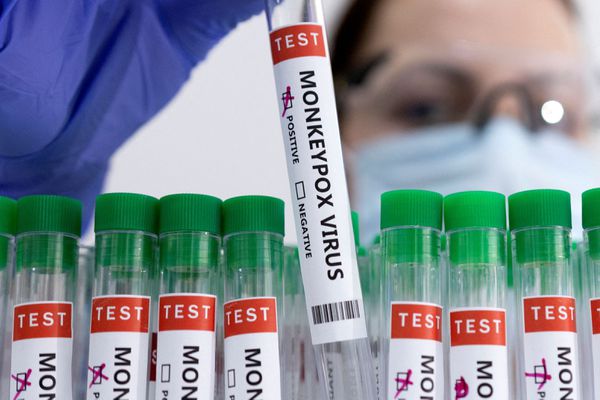:format(jpeg)/cloudfront-us-east-1.images.arcpublishing.com/tgam/62J44VLPMBPRZCPWBTR5NEUZ7U.JPG)
Test tubes labelled “Monkeypox virus positive” are seen in this illustration taken May 23, 2022.DADO RUVIC/Reuters
Early public health messaging that indicated a new outbreak of monkeypox was primarily affecting gay men quickly degenerated into mischaracterizations of it as “a gay disease,” say health experts and LGBTQ advocates, who fear the misinformation could hamper efforts to prevent the virus from spreading.
”The discrimination and stigmatization, not only do they hurt those communities, they hurt our ability to fight the disease,” said Timothy Caulfield, Canada Research Chair in Health Law and Policy at the University of Alberta.
Monkeypox, a rare, infectious disease similar to but less severe than smallpox, spreads through any form of close contact. Though cases are climbing, most people recover within two to four weeks from the viral infection, which causes fever, aches and rashes. Infectious disease experts stress monkeypox is less transmissible and easier to detect and contain than COVID-19.
While health officials should do risk reduction with populations currently hit by this virus, “the big picture here is that anyone can get this,” Mr. Caulfield said.
The current outbreak includes 25 confirmed cases in Quebec, one confirmed and four suspected cases in Toronto, health officials said mid-week. The outbreak is unusual, experts say, because the virus is multiplying beyond regions where it is endemic in west and central Africa. Many cases were identified among men who have sex with men and who sought help at primary care and sexual health clinics.
“What seems to be happening now is that it has got into the population as a sexual form, as a genital form, and is being spread as are sexually transmitted infections, which has amplified its transmission around the world,” WHO adviser David Heymann told Reuters earlier this month.
During a question-and-answer session on Monday, Andy Seale, an adviser with the WHO’s HIV, hepatitis and sexually transmitted infections program, clarified how the virus is spreading.
“While, for example, we’re seeing some cases amongst men who have sex with men, this is not a ‘gay disease,’ as some people on social media have attempted to label it,” Dr. Seale said. “Anybody can contract monkeypox through close contact.”
While community health experts and LGBTQ advocates are heartened to see formal pushback against homophobic portrayals of the virus, some worry that the first updates on this outbreak were damaging.
“Early messaging often takes a foothold and later messages aren’t listened to,” said Mary Fernando, an Ottawa physician who writes about improving public health messaging.
“It is important to choose your words carefully, particularly when you’re talking about groups that have the potential to be stigmatized. … We’ve seen how quickly that initial messaging can be weaponized,” said Mr. Caulfield, who co-founded ScienceUpFirst, a national initiative that works with independent scientists, health care experts and other thinkers to counter misinformation.
This type of scapegoating – mistakenly associating viruses with certain groups of people – is dangerous, said Dr. Fernando. “This is reminiscent of COVID-19, where Trump called it a Chinese disease, which the rest of us thought was inane. However, that took a hold and we saw anti-Asian hate and hate crimes rise.”
The situation echoes early bigoted beliefs around HIV/AIDS, said Ken Monteith, executive director of COCQ-SIDA, the Quebec coalition of AIDS organizations.
“Attaching stigma to a disease is not a useful tool in eliminating a disease,” Mr. Monteith said. “Monkeypox is a virus. It seeks to reproduce itself, that’s all. It doesn’t care who you are. It doesn’t care what kind of close contact it is.”
Such mischaracterizations can also cause under-reporting: the framing of monkeypox as “a gay disease” may hinder those who don’t wish to be identified with the gay community from reporting their symptoms, Mr. Monteith said.
At the same time, monkeypox updates that focus disproportionately on gay men “discourage everyone else from listening,” creating complacency among the population, he said.
Here again are parallels to the false sense of security seen during the early waves of COVID-19: People latched onto the idea that the virus only affected the elderly, with children and young people spared.
“We found all of this to be untrue,” said Dr. Fernando, noting that people want to feel safe during outbreaks. “We’re all tired from COVID, from worrying about stuff. Monkeypox is coming up? ‘If I don’t have to worry about it, I prefer it to be that way.’ ”
Last Saturday, the World Health Organization (WHO) reported 92 confirmed and 28 suspected monkeypox cases in 12 countries, though experts stressed that number has since climbed. As of Thursday, 294 confirmed and 79 suspected cases were estimated across a number of nonendemic countries including Canada, according to Moritz Kraemer, a University of Oxford associate professor who specializes in epidemiology and genomics. Dr. Kraemer works with Global. Health, a data science initiative offering open access to real-time epidemiological data worldwide. No deaths have been reported, according to the WHO.
The virus transmits through close contact with an infected person’s lesions, body fluids, respiratory droplets and contaminated clothing, bedding or utensils.
In the face of monkeypox spread, experts urged clear, factual and non-judgmental public health care messaging.
“People need to know the symptoms; is there a treatment; if it goes away by itself, are you still infectious,” Mr. Monteith said. “That’s how we put an end to disease transmission: it’s by people sharing the right information without stigma.”
Viewing his social media channels, Mr. Caulfield observed that the same voices who had spent the pandemic spreading misinformation online were doing it again with monkeypox.
“It was like these receptors were ready … to keep the agenda rolling, that certain others can be blamed for our problems,” he said. “When stigmatizing messaging plays to existing prejudices and fears, it’s more likely to spread and take hold.”
Mr. Monteith put it another way: “if we had a monkeypox outbreak among soccer moms, I don’t think we would be stigmatizing soccer moms. We’re stigmatizing the gay community because we like to do that.”







